Chronic illness affects millions of people worldwide and is defined as a long-lasting health condition that may not have a complete cure. These conditions can range from mild to severe and can manifest in various forms, including diabetes, peptic ulcers, heart disease, hypertension, chronic kidney disease (CKD), asthma, and more. Also, although the term ‘chronic illness’ typically refers to conditions that are not autoimmune in nature, all autoimmune conditions, such as Rheumatoid Arthritis (RA), Multiple Sclerosis (MS), psoriasis, Graves’ disease, etc., are chronic. If you or someone you care about is living with a chronic disease, the following steps for coping with chronic illness aim to empower you with knowledge and insight so you can better understand and manage your condition.
Those who live every day grappling with chronic illnesses inevitably encounter diverse sets of challenges to face both physically and mentally. Regardless of how symptoms manifest from person-to-person, mental health is an equally important aspect to consider in the overall well-being of those with chronic illness. Thankfully, the following strategies can help navigate these obstacles and, when applied, can ultimately lead to an improved quality of life.
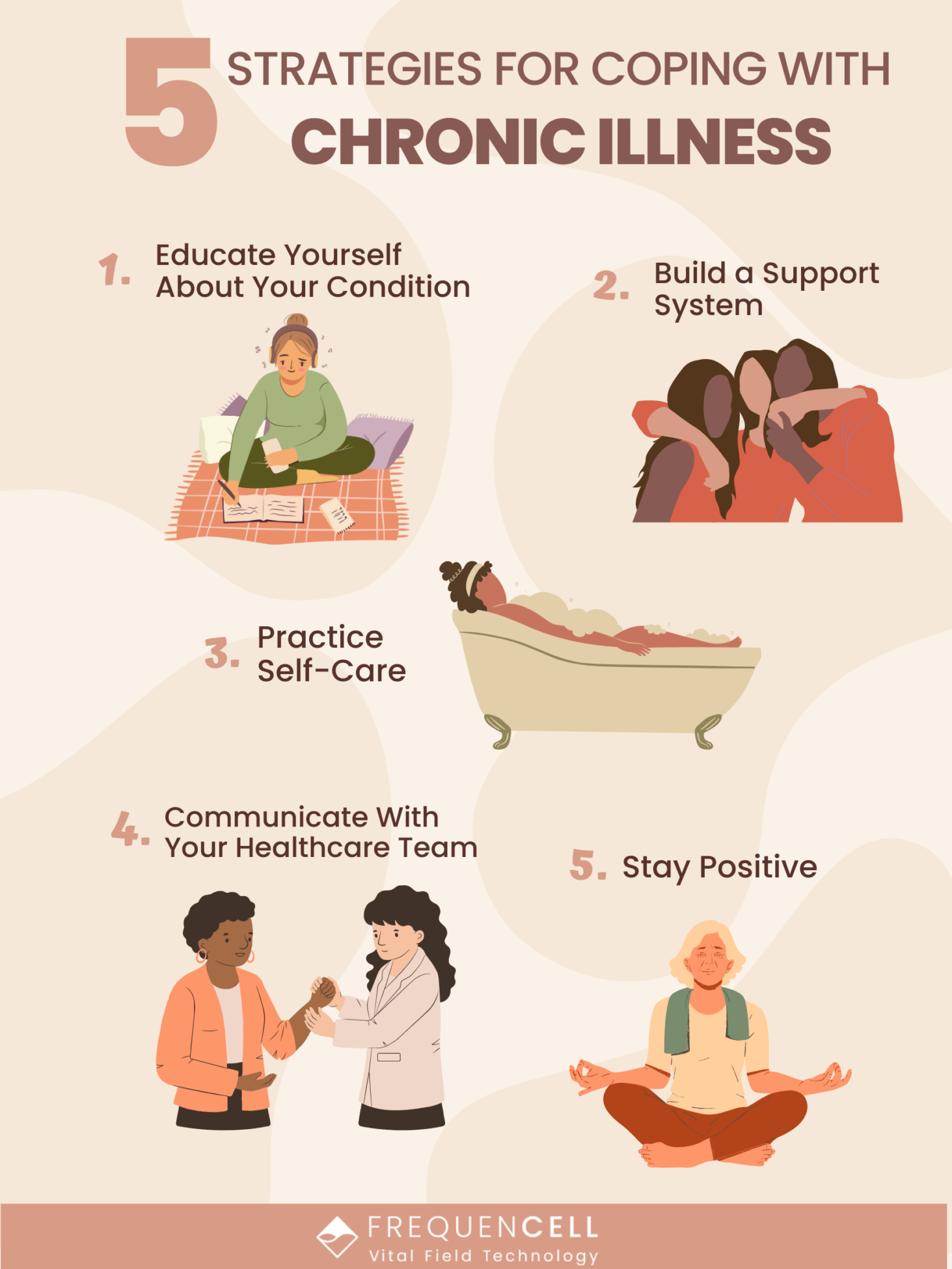
1. Educate Yourself About your Condition
Education plays a crucial role in coping with chronic illness. Understanding the ins and outs of your condition helps to improve your communication with healthcare providers. It also provides you with more confident decision-making, and a greater sense of control over your health. Educating yourself also enables you to recognize and respond to potential complications or changes in your symptoms proactively.
Living in the information age has its advantages and disadvantages. Not all information available online or in print is accurate or reliable. Stick to reputable sources, such as government health websites, national organizations dedicated to specific chronic conditions, or peer-reviewed medical journals. Some sites you may find useful include the Centers for Disease Control and Prevention (CDC), the World Health Organization (WHO), and the National Institutes of Health (NIH).
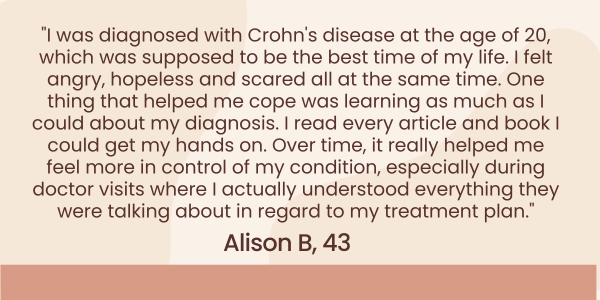
2. Build a Support System
We’ve all heard the saying “there’s strength in numbers.” When navigating through the turbulent waters of chronic illness, it’s never been more true. Support groups, both in-person and virtual, can be a valuable source of information, as well as much needed emotional support. Engaging with others who share your condition can offer insights into personal experiences, practical tips, and coping strategies that you may not find in conventional resources.
A strong support system is invaluable when it comes to coping with a chronic disease. The people who surround you— friends, family, co-workers, healthcare professionals, or fellow patients—can offer emotional encouragement, practical assistance, a sense of belonging and feeling heard and seen.
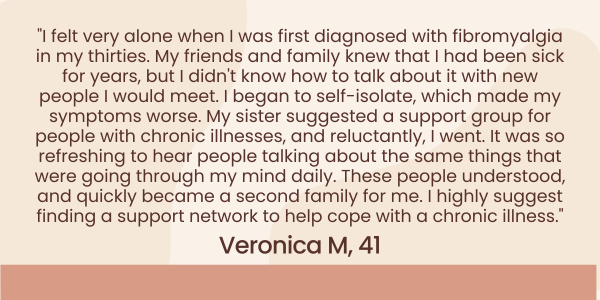
3. Practice Self Care
When coping with chronic illness, there is no such thing as too much self care. By focusing on your mental, emotional, and physical well-being, you can significantly improve your quality of life and better manage the challenges of your condition. Prioritizing sleep and physical activity, as well as nourishing the body with healthy foods and managing stress are just a few areas you can focus on to better manage the challenges of your illness, ultimately leading to a more rewarding and balanced lifestyle.
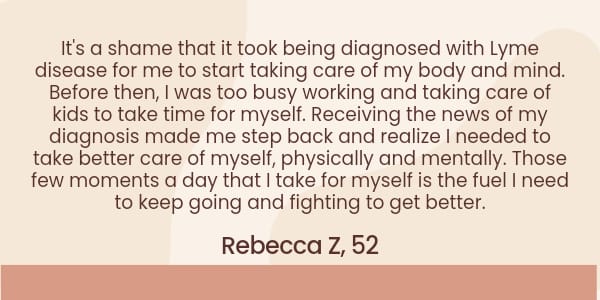
4. Communicate with your Healthcare Team
Maintaining open and effective communication with healthcare professionals is paramount when managing a chronic illness. A strong partnership between patients and their healthcare team fosters informed decision-making and personalized care, leading to improved health outcomes. Effective communication ensures that you and your healthcare team are on the same page, ultimately leading to better management of your chronic illness.
There are many wonderful, attentive, and caring healthcare providers who truly have your best interest in mind. However, there are also times where some doctors can make you feel dismissed, rushed, or invalidated. If you’re struggling to communicate with your healthcare team, consider enlisting the help of a patient advocate. These professionals can assist with navigating the healthcare system, addressing concerns, and ensuring your needs are understood and met.

5. Stay Positive
It is completely understandable that you may feel like you are not in control of your own body when diagnosed with a chronic illness. However, the one area you can always control is your attitude about your illness. Embracing optimism and focusing on the brighter side of life can have profound effects on both physical and mental health.
Maintaining a positive outlook throughout the ups and downs of chronic illness might seem daunting or even unrealistic, but there are several strategies that can help cultivate the power of positivity. First and foremost, practicing gratitude can significantly impact your perspective. By regularly acknowledging and appreciating the positive aspects of life, you can shift the focus away from the illness and towards the blessings you still have. Keeping a gratitude journal or sharing daily gratitude with part of your support system are simple ways to make this practice a part of everyday life.
Finally, remember that setbacks are a natural part of living with chronic disease, and it’s important to be kind to yourself during these times. Instead of dwelling on what went wrong, focus on learning from the experience and identifying ways to bounce back. By acknowledging that setbacks are temporary, it helps to maintain a positive attitude and continued progress in your health journey. You are resilient, strong, and empowered to navigate the challenges of chronic illness with strength and grace!
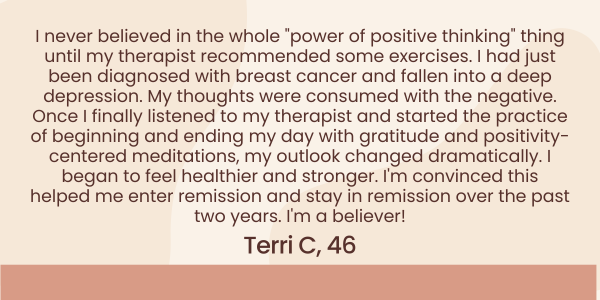
Conclusion
Remember that coping with chronic illness is a unique journey for each person, and learning how to manage it effectively takes time, patience, and self-compassion. As you navigate this path, be kind to yourself and acknowledge that setbacks and challenges are a natural part of the process. Embrace your own journey, and strive to find a balance that allows you to maintain your well-being–both physically and emotionally.
As you move forward, continue to prioritize self-care, maintain open communication with your healthcare providers, and be proactive in seeking out resources and strategies that can enhance your quality of life. And remember just how impactful a positive attitude can be! By doing so, you will empower yourself to live a more fulfilling and resilient life, even in the face of chronic illness.




